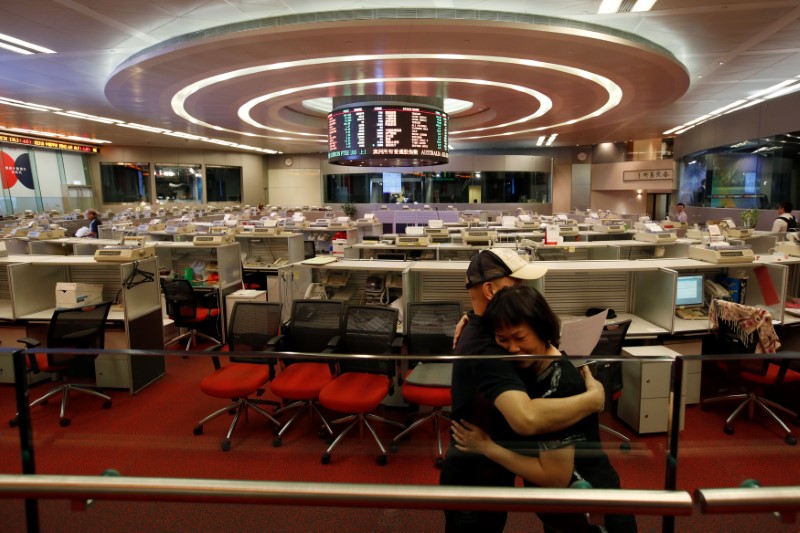By Donny Kwok
HONG KONG (Reuters) - The lights go out and screens turn blank in the trading hall of Hong Kong's stock exchange this week, marking the end of an era for the red-carpeted, cavernous space that was home to more than a thousand floor traders in its heyday.
Opened in 1986 with the merger of four exchanges in the Asian financial hub, the bourse follows in the footsteps of global peers such as Tokyo, Singapore and London, which have all closed their doors amid a shift toward electronic trading in recent years.
Floor trading in Hong Kong accounted for more than 20 percent of total turnover in January 2000, when more than a thousand traders dressed in numbered red vests would engage in frenzied buying and selling in the hall of over 900 booths.
Fast-forward more than 10 years and the floor trade accounted for just 0.3 percent of total turnover and hosted a meager 30 traders physically present.
The loss of a piece of the former British colony's colorful mercantile heritage comes as the city strives to assert economic relevance in Greater China amid rising competition from mainland cities such as Shanghai and Shenzhen.
"It is sad to see it closing down," said Catherine Cheung, a floor trader in her mid-50s. "It hurts in a way that is worse than suffering a trading loss. We can still earn back a trading loss but we cannot reopen a trading floor after it's closed."
Cheung, who works for a local brokerage with just nine employees, began working as a floor trader in 1994.
"I'm now over 50. I will continue to be a trader but in the office," she said. "We won't quit (trading) as it is a way to keep our blood boiling and our heart beating."
The darkest day for the exchange came in October 1987 when Black Monday, as it became known, started in Hong Kong and quickly spread to markets globally. Stocks plunged, forcing bourse chairman Ronald Li to shut the exchange for four days.
Traders have been packing up since mid-October and there will be no traders on the floor after Oct 27.
It was one of a handful of exchanges globally that still hosted open-floor trading. In Asia, the Philippine Stock Exchange still uses live trading floors.
Renovation work will begin at the Hong Kong exchange after Oct. 31, turning the trading hall into a financial services landmark for ceremonies, exhibitions, conferences and investor education. The complex is expected to re-open in February.
Hong Kong Exchanges and Clearing Ltd (HK:0388), Asia's third-biggest equity bourse by market value, which was the world's No. 1 IPO market in 2015 and 2016, is leveraging its role as a gateway to China's deep-pocketed investors to boost revenue as competition with other leading global stock listing venues has intensified.
There were 2,069 companies listed on the main board and Growth Enterprise Market board in Hong Kong as of end-September, with an average daily turnover of HK$95.2 billion ($12.20 billion) over 21 trading days during the month, according to the Hong Kong bourse.
"I'm proud to own my red vest ... I can tell my grandchildren that I was one of the floor traders in those glory days," Cheung said.
